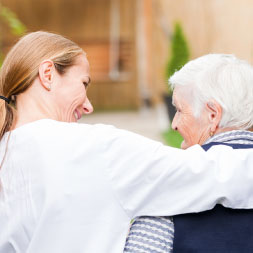Online courses directory (264)
Care relationships within health professions are of great importance and hold a lot of meaning for both the provider and recipient. This free online course will give you a comprehensive understanding and knowledge of care relationships within health professions. The course covers the issue of care relationships in a variety of situations and contexts. Some of the areas covered include: caring in a hospital setting, caring for the elderly and disabled in residential care, hospice care and care as a family affair. Topics such as the limits and boundaries of care, community care, the meaning of home, care transactions, and care of those who are at the end stages of life are also discussed. This course will be of great interest to professionals already in the health or care professions, to learners who are planning a career in the health professions and will also be beneficial to individuals who are either giving or receiving care.
Lose weight, get healthier and fit on all levels in just 14 days with Sadie Nardini
This 12 session course is designed for the beginning or novice archer and uses recurve indoor target bows and equipment. The purpose of the course is to introduce students to the basic techniques of indoor target archery emphasizing the care and use of equipment, range safety, stance and shooting techniques, scoring and competition.
Alcohol is enjoyed by many people during social occasions, but for others addiction to alcohol or alcohol-related illnesses can be a serious health issue. This free online course begins by reviewing the biological effects of alcohol on the body, including hangovers, psychological, and physical disturbances. The course also looks at the effects of chronic alcoholism such as liver damage or fetal alcohol syndrome. Finally, the course reviews some of the treatments for alcohol-related illnesses. This course is ideal for anyone who wants to learn more about the effects alcohol can have on their health, or for learners already working in the areas of health promotion or health awareness who want to further their knowledge and understanding of the health effects of excess alcohol consumption.
Attention licensed acupuncturists and students! Learn how to correctly and successfully treat Bell’s Palsy
This free online course Back Safety training provides learners with useful information on how to take the relevant precautions against back injury at their place of work. This programme combines exercises within each module with a quiz at the end of each module.
This Physical Education (PE or Phys Ed) course offers a comprehensive introduction to the topic and investigates the basics: from muscle response to the physiology, biology, and the science of sports. It covers the scientific basis of fitness and concludes with training principals and methods. It is an ideal course for those studying for a qualification in health or fitness or for sports enthusiasts. It is also an excellent resource for trainers or managers in fitness, health or sports related activities. <br />
This course will explore the different dimensions of sustainability in healthcare and ways to incorporate those ideas into the managerial and quality improvement processes of healthcare organizations. Then it will compare how those issues have been addressed in different healthcare systems around the world. The course will analyze and discuss the key elements of the five pillars of sustainability of healthcare organizations, which are: environmental, socio-cultural, institutional capacity development, financial, and political. We will review critical issues such as recycling medical waste; sustainable energy solutions for hospitals and healthcare organizations in countries with different levels of development; how to improve community health through sustainable healthcare; and many other issues equally relevant to large and small healthcare organizations in developed or developing countries. As the participants review and exchange lessons learned in different corners of the world, they will discover and exchange ideas and tools to assess the sustainability efforts of their organizations and to implement feasible strategies to advance their initiatives.
Read any EKG in seconds
The goals of this instructional course are to get you started in this wonderful sport and to give you a working knowledge of tennis. It should help you to understand the basics of a sport and how to perform these basics. Most of the course will focus on the basic stroke techniques. Variation to those techniques will be presented, as well as drills and games, so that you can take it to the court. Singles and doubles tactics will be covered as well.
In Marathon Training 101, 2011 IDEA Personal Trainer of the Year, exercise physiologist, and author of Running a Marathon For Dummies, Dr. Jason Karp, shows you how to take 26.2 miles' worth of steps to run a marathon, whether it's your first one or fastest one. This unique, four-week online course, which runs January 21 to February 18, includes videos, downloadable podcast workouts, "homework" training runs, and active discussions with other people just like you. It gives you everything you need to know to run a marathon, including: * The fundamentals of marathon training * The knowledge you need to select the right resources for your training * How to structure your very first 20-week marathon training plan * Shoe selection * Ten things you must do on marathon race day * Secrets of long runs * How to avoid injuries The course instructor recommends purchase of a textbook or other course materials. Please see the details below. Recommended materials: Running a Marathon For Dummies, by Jason Karp Where to purchase: www.runcoachjason.com/merchandise or Amazon.com Approximate cost: $18
Health professionals and students and health consumers interested in learning about patient safety will acquire foundational knowledge of the principles of the science and culture of safety in healthcare in this five-week course.
Introduction to the linguistic study of language pathology, concentrating on experimental approaches and theoretical explanations. Discussion of Specific Language Impairment, autism, Down syndrome, Williams syndrome, normal aging, Parkinson's disease, Alzheimer's disease, hemispherectomy and aphasia. Focuses on the comparison of linguistic abilities among these syndromes, while drawing clear comparisons with first and second language acquisition. Topics include the lexicon, morphology, syntax, semantics and pragmatics. Relates the lost linguistic abilities in these syndromes to properties of the brain.
This course provides an exciting, eye-opening, and thoroughly useful inquiry into what it takes to live an extraordinary life, on your own terms. The instructors address what it takes to succeed, to be proud of your life, and to be happy in it. Participants tackle career satisfaction, money, body, vices, and relationship to themselves. They learn how to confront issues in their lives, how to live life, and how to learn from it.
A short version of this course meets during the Independent Activities Period (IAP), which is a special 4-week term at MIT that runs from the first week of January until the end of the month. Then this semester-long extension of the IAP course is taught to interested members of the MIT community. This not-for-credit course is sponsored by the Department of Science, Technology, and Society. A similar, semester-long version of this course is taught in the Sloan Fellows Program.
Acknowledgment
The instructors would like to thank Prof. David Mindell for his sponsorship of this course, his hopes for its continued expansion, and his commitment to the well-being of MIT students.
The purpose of this class is to tell you something about our Tech Dinghy and how to sail it. This OCW site is arranged as a series of skills, explained both with lecture notes and videos. Please do not think of these skill checks as tests, but instead, as measures of your understanding of our sport. We don't expect perfection from our beginners, but only that our members be able to safely handle the boats and themselves on the Charles. For those who wish it, there will be much more that can be learned about other boats and other waters, but what can be learned here will provide the basis to build on. For more detail, a text on sailing the Tech Dinghy is provided in the readings section.
This 12 session course is designed for the beginning or novice weight lifter, or for those who have experience lifting but lack proper instruction. We will provide an understanding of the biomechanics involved, muscles used for a given exercise, and program development.
This course addresses the challenges of defining a relationship between exposure to environmental chemicals and human disease. Course topics include epidemiological approaches to understanding disease causation; biostatistical methods; evaluation of human exposure to chemicals, and their internal distribution, metabolism, reactions with cellular components, and biological effects; and qualitative and quantitative health risk assessment methods used in the U.S. as bases for regulatory decision-making. Throughout the term, students consider case studies of local and national interest.
D-Lab Health provides a multidisciplinary approach to global health technology design via guest lectures and a major project based on fieldwork. We will explore the current state of global health challenges and learn how to design medical technologies that address those problems. Students may travel to Nicaragua during spring break to work with health professionals, using medical technology design kits to gain field experience for their device challenge. As a final class deliverable, you will create a product design solution to address challenges observed in the field. The resulting designs are prototyped in the summer for continued evaluation and testing.
This course illuminates current theories about autism together with challenges faced by people on the autism spectrum. Theories in communicating, interacting socially, managing cognitive and affective overload, and achieving independent lifestyles are covered. In parallel, the course presents state-of-the-art technologies being developed for helping improve both theoretical understanding and practical outcomes. Participants are expected to meet and interact with people on the autism spectrum. Weekly reading, discussion, and a term project are required.
Walk through the basics of nutrition, how eating disorders develop, and learn the benefits of various diets.






















